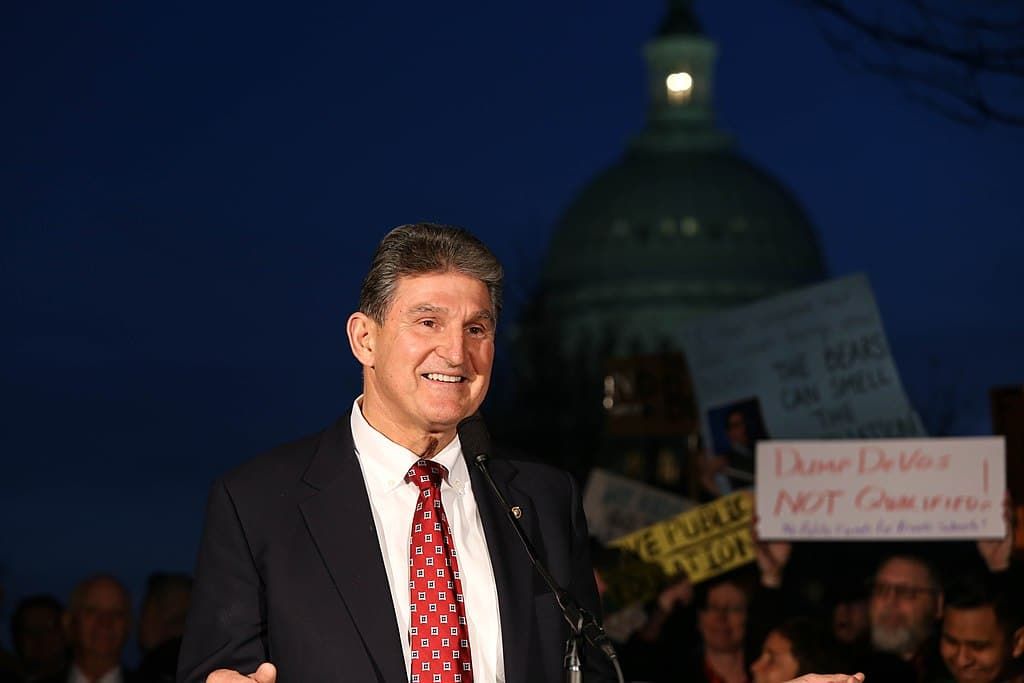Joe Manchin listens to WV climate activists. But does he hear them?
By Jessica McKenzie | October 26, 2021
 Sen. Joe Manchin. Photo by Senate Democrats/Wikipedia
Sen. Joe Manchin. Photo by Senate Democrats/Wikipedia
This Saturday, the West Virginia Climate Alliance will hold a rally for climate action in Charleston, West Virginia, to urge US Sen. Joe Manchin, a Democrat, to support strong climate legislation. The event shouldn’t come as a surprise to him; West Virginian environmentalists have been petitioning Manchin to do something about climate change for years.
Jim Probst, a state coordinator with the West Virginia Citizens’ Climate Lobby, said his group is in regular contact with the senator’s office—meeting twice a year in person when possible and by video conference since 2020—and that he has personally met with Manchin on several occasions.
Perry Bryant, who co-founded the West Virginia Climate Alliance in 2020, explained that it’s a small state, and he has known Manchin for more than 20 years and has met him multiple times.
“I think there’s a perception that everybody in West Virginia is opposed to climate solutions,” Bryant told the Bulletin. “And that’s simply not the case.”
The state is starting to feel the impacts of climate change as heat waves and flooding become more frequent and severe. “West Virginians are aware of the impact of climate change, and they’re concerned about it,” said Bryant. “At the same time, coal is part of our culture. It’s embedded in our literature and our music. It’s part of our identity. So it’s going to be difficult to transition away from coal, but absolutely necessary.”
Manchin has become a major player in negotiations over a wide-ranging Democratic bill originally proposed to contain more than $3 trillion in spending over a decade on a variety of domestic policy and climate initiatives. Because the Democrats hold only 50 seats in the Senate, every Democratic senator would have to vote in favor of the bill for it to pass, giving Manchin great leverage over its cost—which he considers too high—and composition.
This month Manchin successfully pushed to strip a key climate provision from the wide-ranging Democratic budget bill that many hoped would bring about significant reductions in greenhouse gas emissions by incentivizing the switch to clean energy sources and penalizing the continued use of fossil fuels like coal. On Monday, the New York Times reported yet another climate provision is in Manchin’s crosshairs: a fee on emissions of methane, a greenhouse gas 25 times more potent than carbon dioxide. These actions are at odds with what West Virginia activists have asked him to do.
The West Virginia Citizens’ Climate Lobby’s primary goal is to put a price on carbon dioxide emissions, and to return the money collected via a tax or carbon market to American households—and coal workers and communities in particular—to aid in the transition to a clean energy future.
The Climate Alliance—made up of 20 separate environmental, faith-based, civil rights, and other civic organizations—has its own three-part mission: to ensure those who contributed least to global warming don’t pay the highest price; to help coal miners and coal-mining communities transition to a low carbon economy; and to significantly reduce greenhouse gas emissions, in line with the benchmarks set by the Intergovernmental Panel on Climate Change.
Manchin should be well aware of these goals by now. He heard out the Climate Alliance earlier this year.
“He can dominate a meeting and just kind of take over and talk about the things that he wants to talk about and never get to the things you want to talk about,” Bryant acknowledged. “That was not the case in our May meeting. He listened very respectfully, and we listened to what he had to say. It was a very good dialogue, and I think everybody who came out of that meeting said this was one of the best meetings we’ve ever had with Senator Manchin.”
“He’s very friendly,” Probst said. “He’s very warm. He’s been expressing frustration in phone calls lately that we can’t meet in person and he can give us hugs.”
During one in-person meeting in Washington, D.C., Probst recalled, the senator’s staff kept stepping into the room to say “Senator, you have another meeting,” and he’d say, “Give me a couple more minutes.”
“He likes to talk,” Probst said. “We had a meeting with him in his office in Charleston. And at the time, we did this presentation. And it was funny. We did an old-school flip chart kind of presentation. We had an easel, and visuals, and all this. And as we’re walking out, he just kept talking to us, and he just kept talking about how it’d been a long time since he had anyone do that kind of a presentation with him, and how he enjoyed it. He is very personable. He’s very down-to-earth. I think he likes to be in settings where he’s not in a coat and tie, and he could be in blue jeans, and hang with people.”
“That’s part of the problem, actually,” Probst added. “In person, I find him very likable.”
Despite Probst and Bryant’s persistence, Manchin does not seem to be getting the climate change message.
The Climate Alliance sent Senator Manchin a letter just before the New York Times reported that he was opposed to the clean electricity performance standard saying that if he was going to change or eliminate that provision, he should come up with or agree to other forms of emissions reductions to meet a goal of 45 percent emissions reduction by 2030.
“The negotiations have been pretty opaque, but so far it doesn’t appear that he’s been able to achieve what we’re asking him to do,” Bryant said.
“He’s been acknowledging the reality of climate change for at least seven years,” Probst said. “He’s never indicated support for what we’re asking of him—but he’s never said, ‘No, we’ll never do that,’ or ‘Yes, thanks for coming in, but we’re not even going to consider that.’ We’ve never gotten that kind of response. And I’ve always held out hope that if we just kept coming, one day he’d go, ‘Those folks have a pretty good idea.’”
When asked whether he’s still optimistic, Probst replied, “Yes. I have to be.”
Together, we make the world safer.
The Bulletin elevates expert voices above the noise. But as an independent nonprofit organization, our operations depend on the support of readers like you. Help us continue to deliver quality journalism that holds leaders accountable. Your support of our work at any level is important. In return, we promise our coverage will be understandable, influential, vigilant, solution-oriented, and fair-minded. Together we can make a difference.
Keywords: Joe Manchin, clean energy, clean energy transition, climate change, climate crisis, coal, west virginia
Topics: Climate Change
















If you think the economy is moire important than the environment, try holding your breath while you count your money. Where do we go when this world won’t sustain us any longer?
Just follow the money, but you will have to do some deep journalistic digging — oops that would take work.
Joe Manchin needs to be primaried out ASAP.
Manchin is snowing you can’t you see that? He doesn’t care about you or anyone on this planet as long as he gets his money.